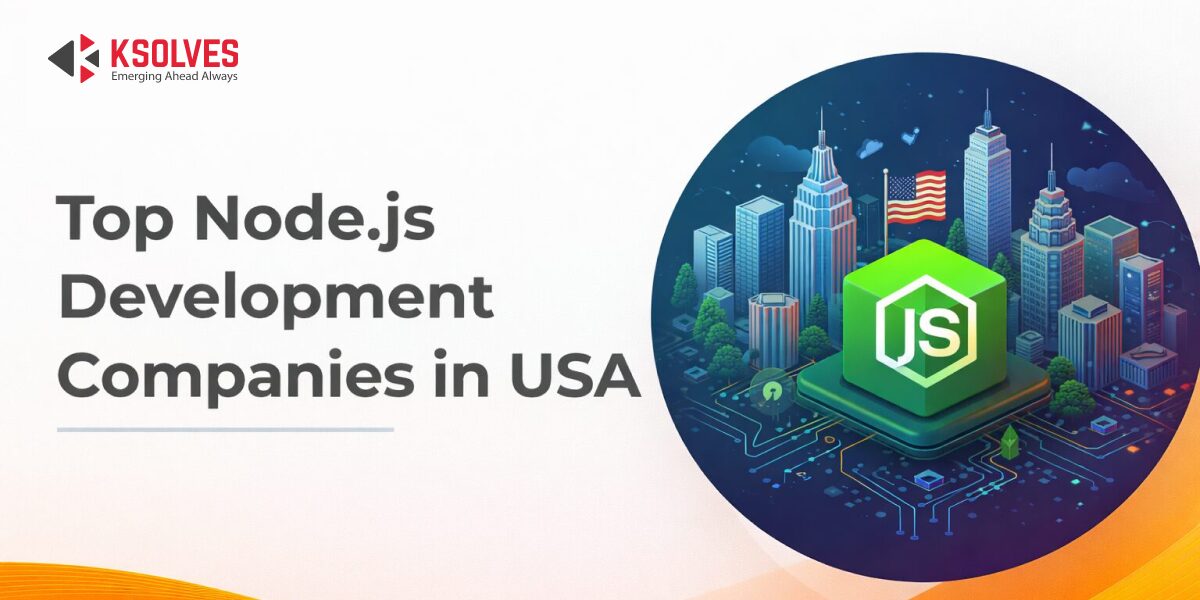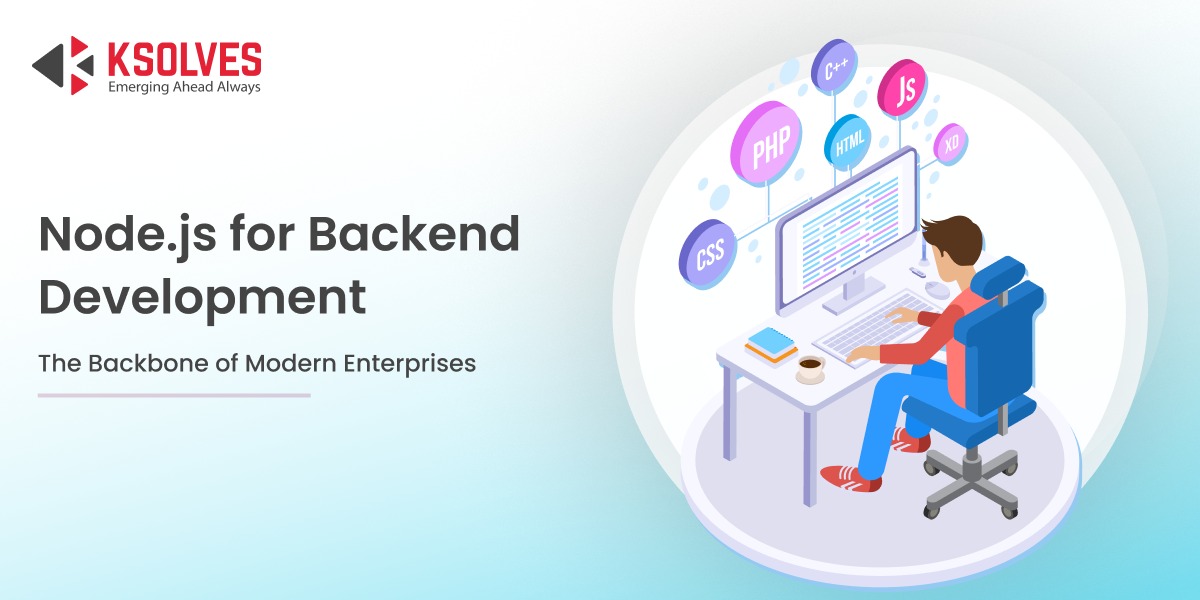Top 10 Node.js Libraries to Supercharge Backend Development
Node.js
5 MIN READ
October 30, 2025
![]()

Node.js has revolutionized backend development by bringing lightning-fast performance and non-blocking, event-driven architecture to the JavaScript world. But writing a powerful backend isn’t just about knowing Node.js – it’s about knowing the right tools that make your life easier, your code cleaner, and your applications faster.
Whether you’re building a real-time chat app, a secure e-commerce system, or a data-driven analytics engine, Node.js libraries help you launch faster without compromising performance or security.
In this article, we’ll dive into the top 10 Node.js libraries that every backend developer should know. From handling real-time communication to securing user data, these tools will supercharge your development process.
What is a Node.js Library?
A Node.js library is a collection of pre-written code that developers can use to perform common tasks without having to write everything from scratch. Think of it as a toolbox filled with ready-made solutions for specific problems – whether it’s connecting to a database, handling authentication, or managing asynchronous tasks. Libraries save time, reduce errors, and allow developers to focus on building features rather than reinventing the wheel.
Node.js libraries are built on top of the Node.js runtime, leveraging its non-blocking, event-driven architecture. They can be installed easily via npm (Node Package Manager) and integrated seamlessly into any Node.js project. By using these libraries, developers can ensure their applications are more maintainable, scalable, and robust.
Why Use Node.js Libraries
- Faster Development: With pre-built functions and modules, developers can implement features quickly without writing everything from scratch. This dramatically reduces development time.
- Consistency and Reliability: Popular libraries are tested and maintained by large communities, ensuring that your application relies on stable and well-documented code.
- Code Reusability: Libraries provide modular code that can be reused across different projects, helping maintain a clean and organized codebase.
- Enhanced Functionality: Node.js libraries extend the capabilities of the core Node.js runtime, offering tools for real-time communication, security, logging, data manipulation, and more.
- Community Support: Most Node.js libraries have strong open-source communities, providing support, tutorials, and regular updates to keep your application up-to-date with best practices.
10 Best Node.js Libraries to Power Your Backend Development
We have curated a list of battle-tested and the most popular Node.js libraries that developers across the globe rely on to build fast, scalable, and reliable backend systems.
1. Socket.io
Purpose: Real-time communication
Socket.io is one of the most powerful Node.js libraries for enabling real-time, bidirectional, and event-driven communication between the client and the server. It’s a go-to choice for developers building dynamic applications that demand instant data exchange, such as live chats, notifications, dashboards, or multiplayer games.
Key Features:
- Built on top of WebSockets with intelligent fallback to HTTP long-polling for broader compatibility.
- Offers seamless automatic reconnection, event broadcasting, and room-based communication.
- Integrates effortlessly with frameworks like Express.js, simplifying real-time feature implementation.
- Supports binary streaming for complex data transfers such as media or files.
Use Case:
Ideal for developing real-time applications, like a live chat or collaboration platform, where messages, updates, or user actions need to reflect instantly across connected clients without page reloads.
2. Axios
Purpose: Simplified HTTP Requests
Another popular Node.js library is Axios. It is a lightweight, promise-based HTTP client that makes it effortless to send asynchronous requests from Node.js applications. It’s widely used to fetch, send, or update data from external APIs or microservices with clean and readable syntax.
Key Features:
- Supports all major HTTP methods: GET, POST, PUT, DELETE, and more.
- Provides request and response interceptors for centralized error handling, logging, or token management.
- Automatically transforms JSON data, simplifying payload handling.
- Seamlessly integrates with async/await syntax for cleaner, more maintainable asynchronous code.
Use Case:
Perfect for integrating your backend with third-party APIs or internal microservices, such as fetching live exchange rates, processing payments, or retrieving data from remote sources.
3. Mongoose
Purpose: Object Data Modeling (ODM) for MongoDB
Mongoose is a powerful Object Data Modeling (ODM) library for Node.js and MongoDB. It provides a structured, schema-based approach to working with MongoDB, making data management more consistent, efficient, and maintainable. With Mongoose, developers can enforce data integrity while still leveraging the flexibility of a NoSQL database.
Key Features:
- Enables schema definitions with built-in validation, type casting, and default values.
- Supports middleware hooks for pre- and post-database operations, enabling logic automation.
- Allows the population to reference and link related documents easily.
- Simplifies queries with built-in helpers for filtering, sorting, and aggregating data.
- Improves maintainability and reduces boilerplate when interacting with MongoDB.
Use Case:
Ideal for applications managing large, dynamic datasets, such as storing and querying user profiles, medical records, or product catalogs in a structured way.
4. Passport.js
Purpose: Authentication and Authorization
Passport.js is a flexible and modular authentication middleware for Node.js that makes securing applications simple and extensible. With support for over 500 authentication strategies, it allows developers to implement everything from traditional username/password login to OAuth, OpenID, and JWT-based authentication seamlessly.
Key Features:
- Plug-and-play support for popular authentication providers like Google, Facebook, GitHub, and more.
- Lightweight and unopinionated. It integrates effortlessly with frameworks like Express.js.
- Supports both session-based and token-based authentication.
- Extensible with custom strategies to meet enterprise-level security requirements.
- Centralizes authentication logic, reducing redundancy across the application.
Use Case:
Ideal for securing applications that require multiple login options, such as SaaS platforms, social networks, or enterprise apps where users can authenticate via email/password, OAuth providers, or single sign-on solutions.
5. Async
Purpose: Asynchronous Control Flow Management
The next on the list of the top Node.js libraries is Async. It s a utility library designed to simplify the handling of asynchronous operations in Node.js. While modern JavaScript supports promises and async/await, Async remains invaluable for managing complex workflows, especially when tasks need to run in series, parallel, or with dependencies.
Key Features:
- Offers powerful control flow patterns such as series, parallel, waterfall, and queue.
- Simplifies error handling in nested asynchronous operations.
- Optimized for managing multiple tasks efficiently, improving performance.
- Works seamlessly with both callbacks and promises.
- Helps avoid “callback hell,” keeping code cleaner and more readable.
Use Case:
Perfect for scenarios where multiple asynchronous operations need coordination, such as fetching data from several APIs, processing files, or performing sequential database operations while ensuring proper error handling.
6. CORS
Purpose: Cross-Origin Resource Sharing Management
CORS is a lightweight middleware for Node.js that enables secure cross-origin HTTP requests, allowing your backend APIs to communicate safely with clients hosted on different domains. It ensures that your server remains accessible to trusted sources while protecting against unauthorized access.
Key Features:
- Easily configurable to allow specific origins, HTTP methods, and headers.
- Supports credentials and preflight requests for advanced security scenarios.
- Integrates seamlessly with Express.js and other Node.js frameworks.
- Prevents unauthorized domains from accessing your APIs.
- Provides fine-grained control over cross-origin access policies.
Use Case:
Ideal for APIs serving frontend applications on different domains, such as enabling a React or Angular frontend to securely access a Node.js backend hosted elsewhere.
7. Bcrypt.js
Purpose: Secure Password Hashing
Bcrypt.js is a widely trusted Node.js library for encrypting and hashing passwords. It provides strong security through salted hashing, making it extremely difficult for attackers to reverse-engineer passwords, even if the database is compromised.
Key Features:
- Supports both asynchronous and synchronous hashing.
- Generates salted hashes with customizable cost factors for enhanced security.
- Protects against rainbow table and brute-force attacks.
- Easy integration with authentication workflows and user management systems.
- Lightweight and fast, suitable for high-traffic applications.
Use Case:
Ideal for secure user authentication systems, such as storing encrypted passwords during user registration and validating credentials during login, ensuring sensitive data remains protected.
8. Lodash
Purpose: Utility Functions for Data Manipulation
Lodash is a highly versatile Node.js library that simplifies working with arrays, objects, strings, and functions. It provides a wide range of utility methods that make data manipulation, iteration, and transformation faster and more efficient, helping developers write cleaner and more maintainable code.
Key Features:
- Offers over 300 utility functions such as map, filter, cloneDeep, merge, and debounce.
- Enhances functional programming capabilities in JavaScript.
- Optimized for performance and works consistently across Node.js and browser environments.
- Reduces repetitive code and improves readability.
- Supports deep cloning, object merging, and data transformations effortlessly.
Use Case:
Perfect for applications that require complex data operations, like filtering and transforming large datasets, preparing API responses, or manipulating user-generated content before storage.
9. Winston
Purpose: Advanced Logging
Winston is a powerful and flexible logging library for Node.js, designed to handle structured and multi-transport logging for applications of all sizes. It helps developers track errors, monitor performance, and maintain a clear audit trail, which is critical for production-ready systems.
Key Features:
- Supports multiple transports such as console, files, HTTP, and databases.
- Customizable logging levels and formats, including JSON for structured logging.
- Integrates easily with monitoring and alerting tools like Logstash or CloudWatch.
- Provides built-in support for handling exceptions and errors.
- Enables centralized logging for easier debugging and system monitoring.
Use Case:
Ideal for enterprise-level applications requiring detailed logging, e.g., tracking API requests, monitoring user activity, or capturing errors and exceptions in production environments.
10. Puppeteer
Purpose: Browser Automation and Web Scraping
Puppeteer is a high-level Node.js library that provides control over headless Chrome or Chromium browsers. It’s widely used for automated testing, web scraping, performance auditing, and dynamic content rendering, making it a versatile tool for both developers and QA teams.
Key Features:
- Automates browser actions like navigation, clicking, typing, and form submission.
- Captures screenshots, PDFs, and DOM snapshots of web pages.
- Supports headless and full-browser modes for flexibility in testing and automation.
- Ideal for scraping dynamic content rendered by JavaScript-heavy websites.
- Integrates with CI/CD pipelines for automated testing and monitoring.
Use Case:
Perfect for generating automated reports, running end-to-end UI tests, or scraping web content for analytics or research purposes without manual intervention.
Conclusion
Choosing the right Node.js library is crucial for building efficient, maintainable, and scalable backends. The most popular Node.js libraries highlighted in this blog address key development challenges, ranging from real-time communication and secure authentication to data management and automation. They help developers save time and deliver high-quality applications.
At Ksolves, we leverage these libraries to provide expert Node.js development services. Our certified developers use the best tools and practices to build robust, scalable, and secure backend solutions that align with your business goals and accelerate your project’s success.
Have an idea in mind or not sure where to start? Partner with Ksolves and let our Node.js experts turn it into a scalable, high-performance application.








AUTHOR
Node.js
Share with